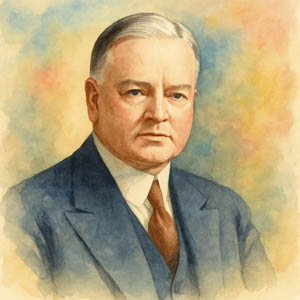 Herbert Clark Hoover (1874–1964), born on this day in West Branch, Iowa, was orphaned at 10, raised in Oregon, and graduated from Stanford with a degree in Geology.
Herbert Clark Hoover (1874–1964), born on this day in West Branch, Iowa, was orphaned at 10, raised in Oregon, and graduated from Stanford with a degree in Geology.
A mining engineer in China, Hoover worked with German and Belgian investors, then became involved in World War I relief efforts—leading to his 1929 Presidential election.
At his inauguration, the Republican promised, "I have no fears for the future of our country. It is bright with hope." Ironically, within seven months, the stock market crashed and the U.S. was mired in the Great Depression, which critics dubbed the "Hoover Depression."
"Blessed are the young, for they shall inherit the national debt," he once said facetiously.
A self-made millionaire and outstanding humanitarian, Hoover signed the 1931 law making the Star-Spangled Banner the national anthem. He later lost to FDR and observed, "Democracy is a harsh employer."
As a former President, he wrote books, raised money for Stanford, and chaired the Boys' Club of America. "The boy is our most precious possession. He strains our nerves, yet he is a complex of cells teeming with affection..."
"...He is a periodic nuisance, yet he is a joy forever," said Hoover, who helped establish 500 new Boys Clubs—halfway to his goal of "a thousand clubs for a million boys."
Though history remembers his presidency with complexity, Hoover’s deeper legacy was that of an orphaned, self-made man who devoted his life to public service, and believed in work, order, and giving back.
More PRESIDENTIAL Quotations
 The ends could move before they meet. Be ready.
The ends could move before they meet. Be ready.
